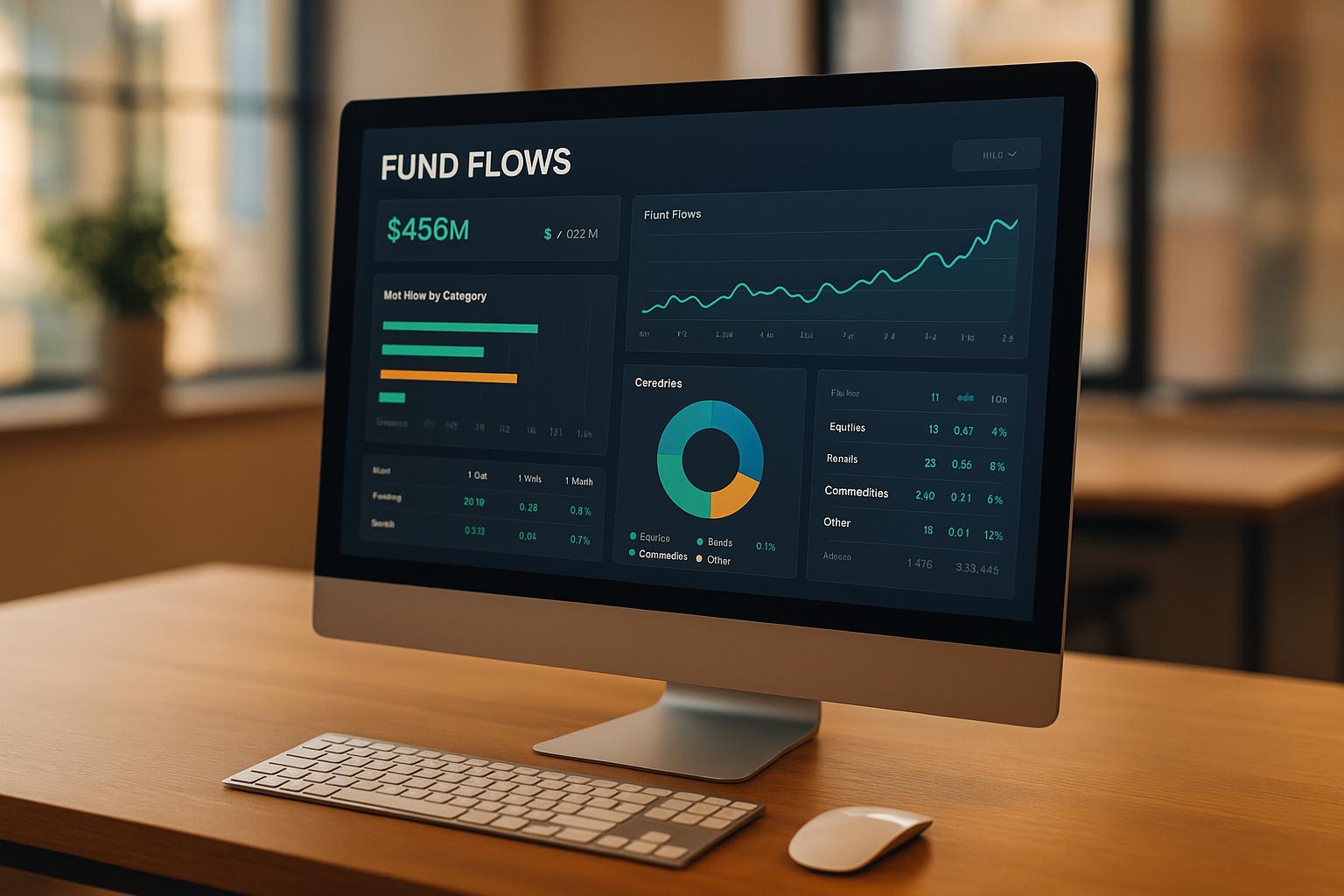Want to track how U.S. politicians trade stocks? Here's a quick guide to the best platforms offering insights into congressional trading activity. These tools leverage the STOCK Act of 2012, which mandates that U.S. lawmakers disclose trades above $1,000 within 45 days. While not real-time, this data uncovers patterns and potential market signals. Platforms like Unusual Whales, Quiver Quantitative, and Smart Insider analyze this data, making it accessible for investors.
Key Takeaways:
- Unusual Whales: Focuses on congressional trades, options flow, and institutional trading. Offers real-time updates and detailed filters. Subscription starts at $50/month.
- Quiver Quantitative: Combines congressional data with backtesting tools and alternative datasets. Free plan available; premium costs $25/month.
- Smart Insider: Provides free and paid datasets for tracking trades by politicians. Pricing for historical data starts at $19.
- Barchart Politician Insider Trading: Free tool with twice-daily updates and visual trade mapping.
- Best Investing Tools Directory: Free directory comparing tools for tracking political trades.
Quick Comparison:
| Platform | Key Features | Pricing |
|---|---|---|
| Unusual Whales | Real-time data, options flow, filters | $50/month |
| Quiver Quantitative | Backtesting, alternative datasets | Free/$25/month |
| Smart Insider | Downloadable datasets, search tools | Free/$19+ |
| Barchart Politician Insider Trading | Visual analytics, free access | Free |
| Best Investing Tools Directory | Tool comparison, free access | Free |
Pro Tip: Use these platforms as part of a broader investment strategy. Combining political trade data with market analysis can help identify opportunities, but avoid blindly copying trades.
Insider Trading & Congress: How Politicians Get Rich From the Stock Market
1. Best Investing Tools Directory
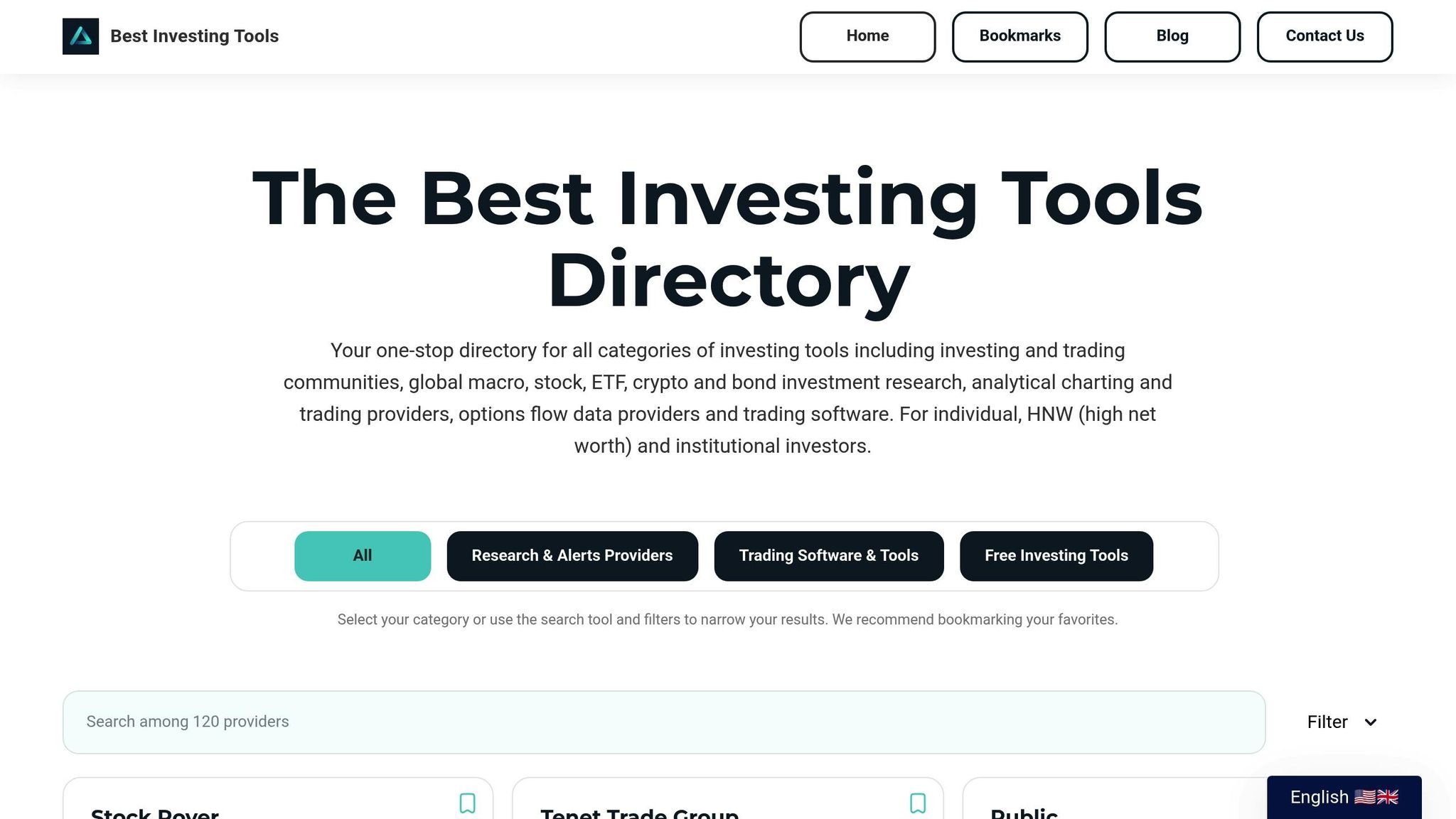
The Best Investing Tools Directory dives into the intersection of politics and market trends by analyzing the trading activities of U.S. politicians. It provides detailed insights into congressional trades, offering a unique perspective on how political decisions might influence financial markets. Let’s take a closer look at its historical trade tracking and how user-friendly features like pricing and reviews enhance its utility.
Historical Trade Insights
This platform doesn't just monitor trades - it uncovers patterns. By analyzing historical data, it highlights unusual trading behaviors, shifts in volume, and significant price changes. For example, research has shown that certain Senators’ stock purchases have outpaced the market by roughly 12% each year. This suggests that elected officials, who often have access to briefings on national security, economic developments, and upcoming legislation, may hold an informational edge. By keeping an eye on these trades, investors can identify potential opportunities for growth.
Pricing and Accessibility
The platform goes beyond just delivering data by making it easy to navigate and compare tools. It includes user reviews and allows filtering by tool type, making it accessible for both individual and institutional investors. The directory’s format lets users compare key features, pricing, and data quality, helping them pinpoint the tools that align best with their investment strategies. Whether you're a seasoned investor or just starting out, the platform equips you with the resources to make informed decisions.
2. Unusual Whales
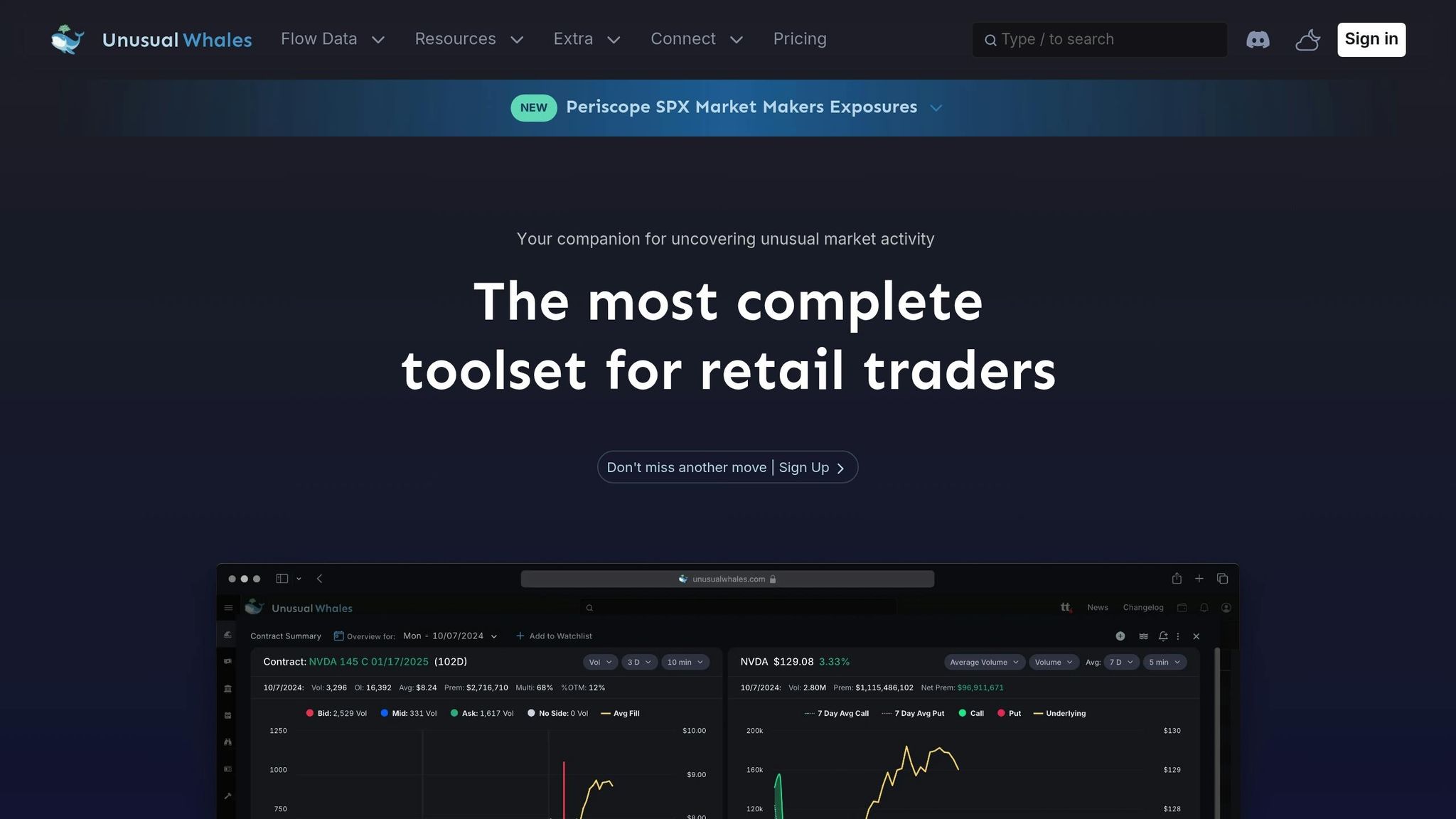
Unusual Whales is a platform that takes congressional trading data and turns it into actionable insights for investors. What sets it apart is its focus on detailed options flow, block trades, and institutional trading patterns, all while incorporating political trading data from STOCK Act filings. This unique blend allows investors to tap into the transparency of political trading for potential investment advantages.
Real-time Trade Data Availability
Unusual Whales gathers trade data through Periodic Transaction Reports. However, legal filing delays - transactions over $1,000 can be reported up to 45 days later - may affect the immediacy of some updates. Despite this, the platform excels at providing real-time data on options flow and institutional trades, ensuring users stay informed on major market movements.
Historical Trade Insights
In 2024, portfolios mimicking Democratic and Republican trades saw returns of 31% and 26%, respectively. This performance even led to the creation of ETFs based on these political trading strategies. As the CEO of Unusual Whales put it:
"When you're a trader or an investor, you're looking for some sort of edge, and people believe this is a sort of edge."
To help investors capitalize on these insights, the platform offers powerful filtering tools tailored to individual investment interests.
Search and Filtering Capabilities
The Trades Tracker tool allows users to filter data by politician, political party, sector, or stock ticker. This level of detail makes it easy to zero in on specific areas - whether you're following a particular lawmaker's trades or tracking activity in sectors like technology or healthcare. Users can also analyze trades by time period and evaluate the performance of individual politicians or entire parties.
To keep investors informed, Unusual Whales sends out custom alerts for congressional trades and publishes annual Congressional Trading Reports. For instance, in 2022, 131 members of Congress were involved in trading, collectively making over 12,700 transactions worth up to $788 million. Remarkably, Congress as a whole outperformed the S&P 500 in total returns that year.
Pricing and Accessibility
Unusual Whales offers subscription plans starting at $50 per month. A free plan is also available, though with limited access to features.
3. Quiver Quantitative
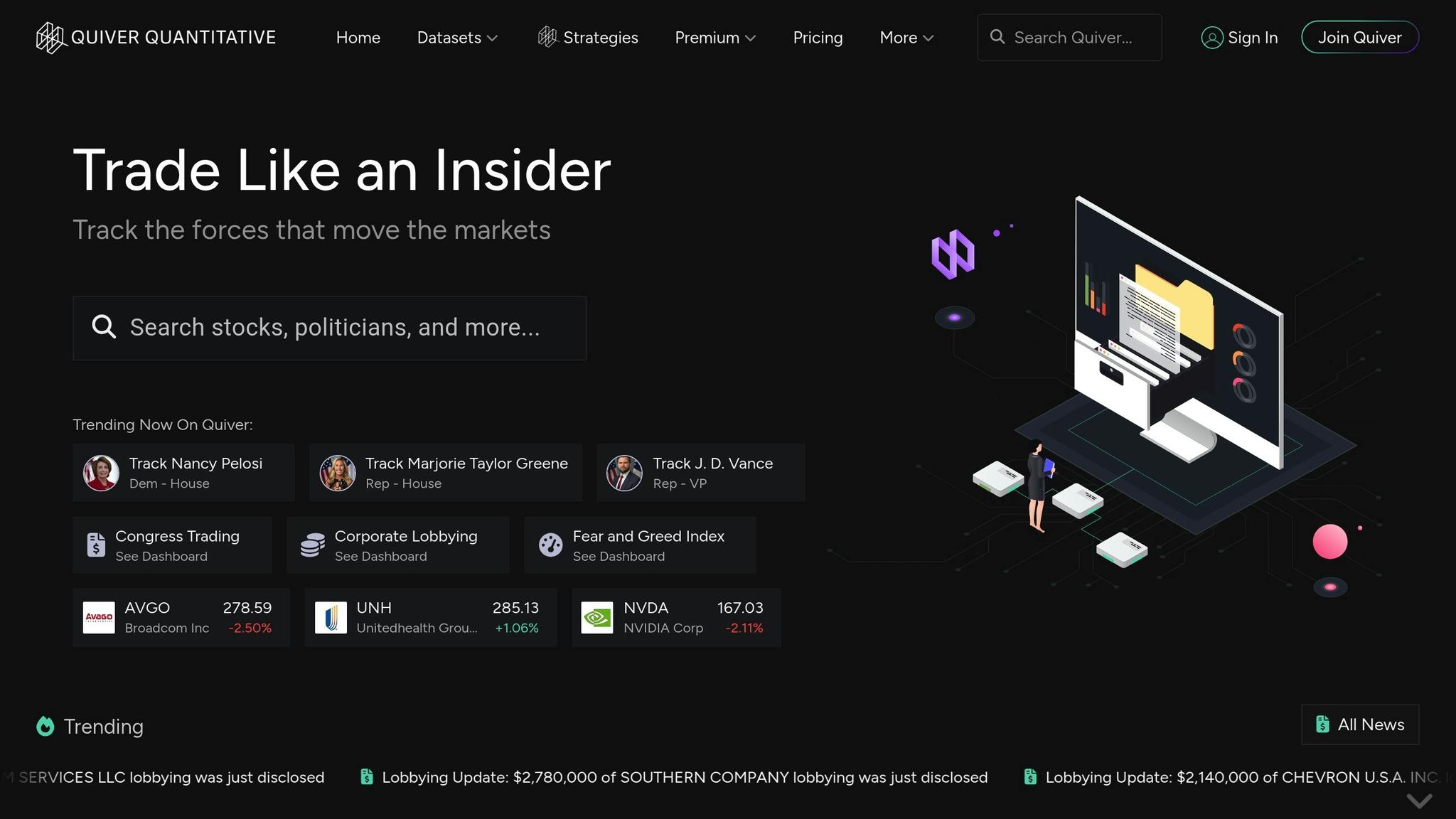
Quiver Quantitative pulls together alternative data from various online sources, offering early market signals. Unlike platforms that focus solely on immediate trading data, Quiver Quantitative stands out by combining alternative datasets with backtesting tools. It builds on the real-time and historical insights provided by other tools while adding a layer of analysis through its unique datasets and backtesting capabilities.
Real-time Trade Data Availability
Quiver Quantitative tracks live data on Congressional trading through its monitoring system. Leveraging the required 45-day disclosure rule, the platform automatically extracts stock trades from these reports and calculates the cumulative returns for each politician. It also monitors the performance of stocks traded by members of Congress or their families, showing recent trade details such as ticker symbols, trade type, politician involved, transaction dates, and estimated excess returns.
Historical Trade Insights
In addition to real-time tracking, Quiver provides historical analysis through its backtesting tools. The Congressional Trading Backtester allows users to simulate strategies based on disclosed trades, filtered by variables like political party, committee membership, and transaction size. This tool uncovers historical trading patterns with impressive accuracy - independent analyses confirm that Quiver's database aligns with official records over 99% of the time. As Quiver Quantitative explains:
"Our mission is to bridge this information gap between Wall Street and Main Street, and make high-quality alternative data accessible to everyone".
The platform also includes a Social Sentiment Backtester, which evaluates investment strategies by analyzing shifts in social sentiment around specific stocks.
Search and Filtering Capabilities
The platform’s unified search bar simplifies access to its datasets. Users can quickly search for information on Congressional trading, House and Senate activities, or government contracts. It also extends to specialized datasets, including COVID-19 research, patents, and corporate lobbying records. Congressional trading activity can be organized by individual politicians or by specific stocks, offering flexibility and clarity.
Pricing and Accessibility
Quiver Quantitative offers two subscription options. The Visitor plan, which is free, provides access to live data on Congressional trading, insider trading, government contracts, corporate lobbying, and other alternative datasets. For those seeking more advanced features, the Premium plan costs $25 per month or $300 annually. This tier includes additional tools like strategy copytrading, alerts, a stock screener, and the Congress backtester.
sbb-itb-2e26d5a
4. Smart Insider
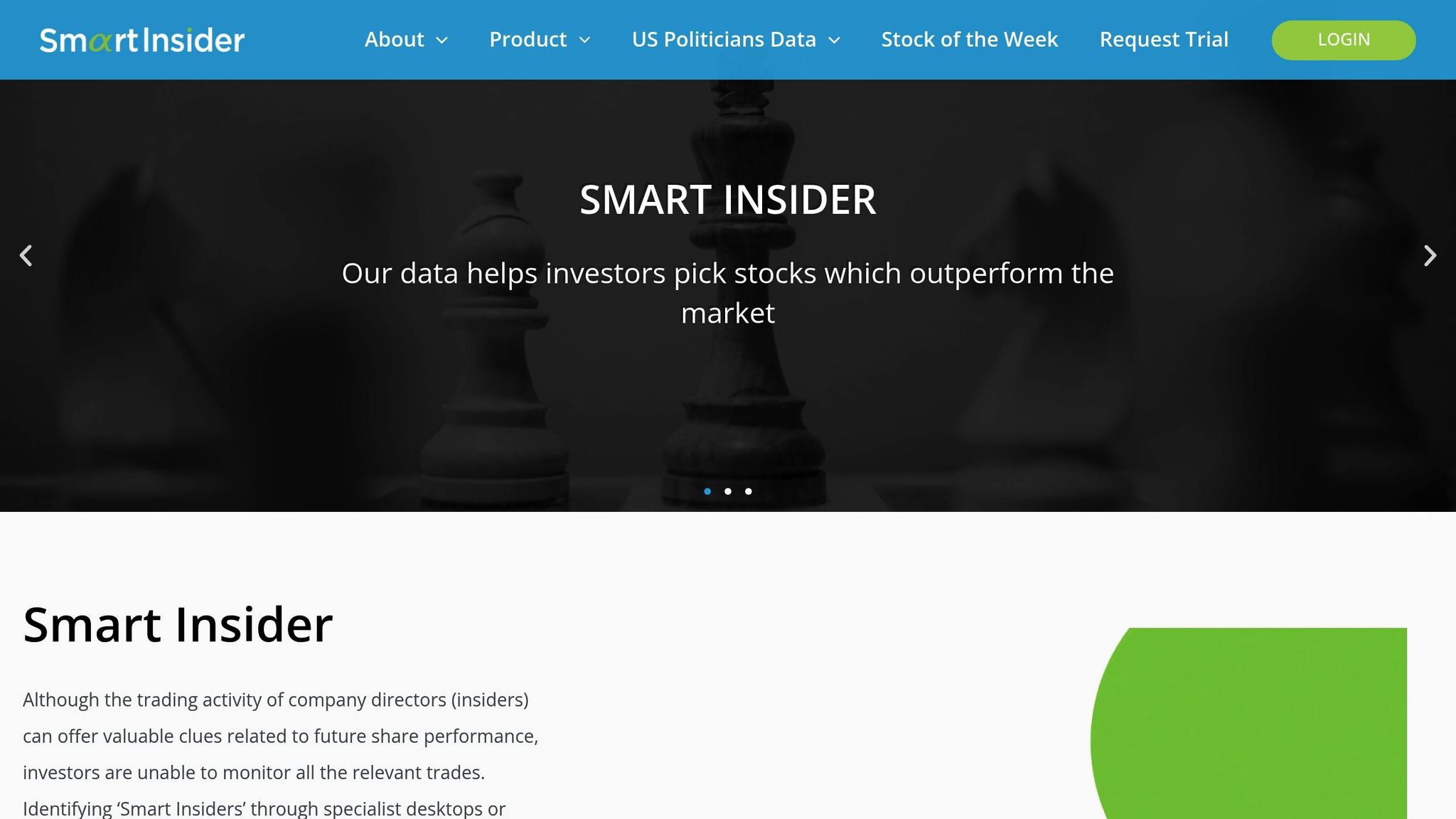
Smart Insider offers both free and premium datasets designed to track congressional trading activity. By pulling and analyzing official congressional disclosures, the platform provides an accessible way to see which politicians are linked to specific stocks and how their positions evolve over time.
Real-Time Trade Data Access
Smart Insider emphasizes immediate access to trading data. Its free database allows users to search for trades by members of Congress or specific stocks. The platform highlights recent transactions and identifies the most active lawmakers. This aligns with transparency requirements mandating Congress members to disclose their stock trades publicly.
Historical Trade Data
For those interested in past trends, Smart Insider offers downloadable datasets based on official congressional disclosures. These datasets include:
- Last 30 Days: Covers 25+ politicians, 600+ transactions, and 300+ stocks.
- Last 90 Days: Includes 50+ politicians, 2,000+ transactions, and 700+ stocks.
- Last 365 Days: Features 100+ politicians, 8,000+ transactions, and 1,500+ stocks.
These datasets provide a comprehensive look at trading activity over different timeframes.
Search and Filtering Features
Smart Insider's search tools enable users to filter data by individual politicians or specific stocks, making it easy to track particular trades or analyze entire portfolios. For institutional users, the platform also offers advanced quantitative data feeds, desktop tools, and signals. These can be delivered through various channels, including SFTP, API, Snowflake, or AWS S3, allowing for seamless integration into existing workflows.
Pricing and Data Formats
Smart Insider operates on a dual pricing model, offering a free database for basic searches and premium datasets for more in-depth insights. Pricing for downloadable historical data is as follows:
- Last 30 Days: $19 per dataset
- Last 90 Days: $39 per dataset
- Last 365 Days: $129 per dataset
All datasets are available for one-time download in CSV and Excel formats. This pricing structure ensures accessibility for a wide range of users, from casual observers to serious investors. Smart Insider wraps up our review of essential tools, setting the stage for a side-by-side comparison of all platforms.
5. Barchart Politician Insider Trading
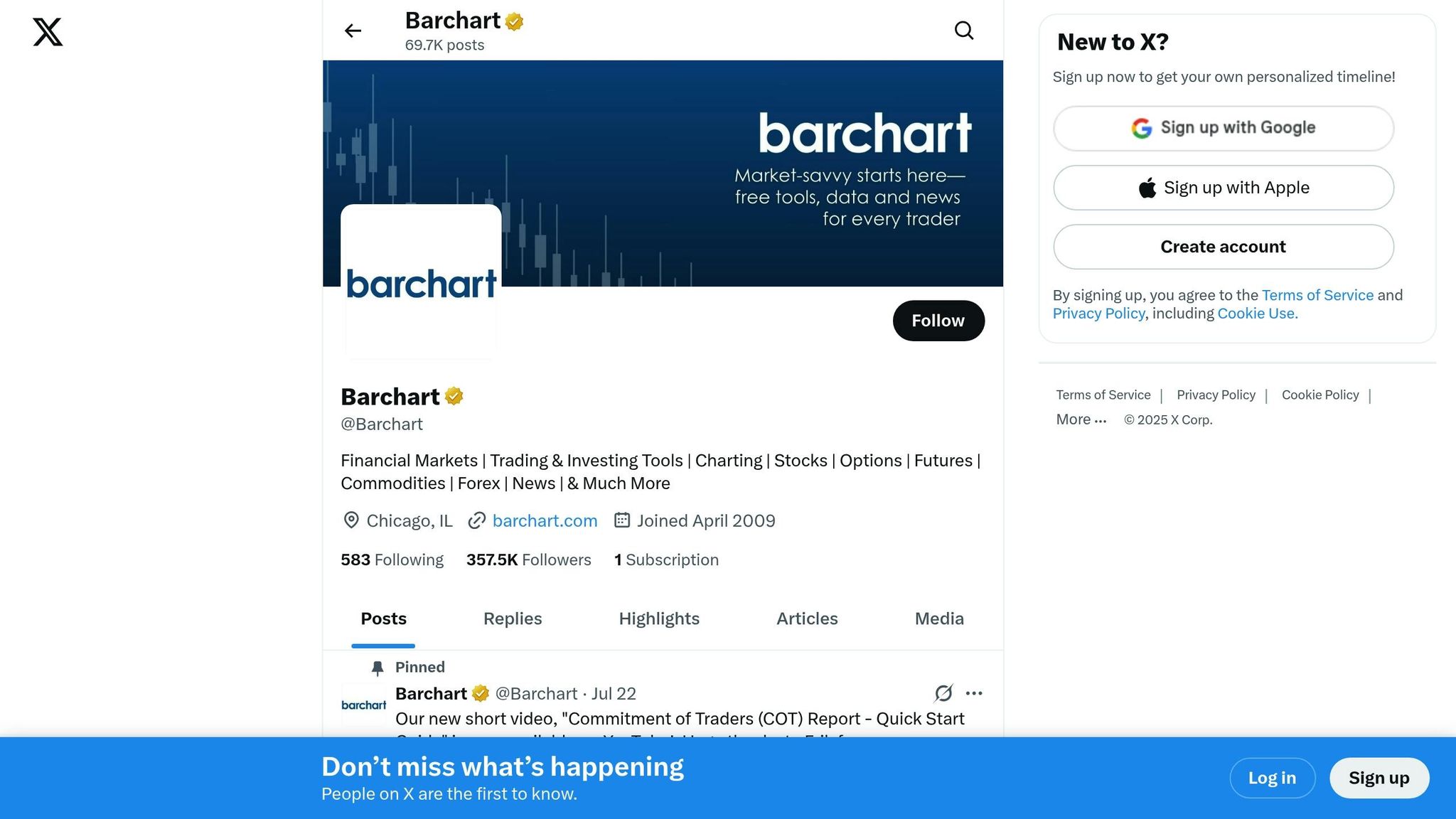
Barchart's Politician Insider Trading page keeps tabs on trades made by members of the US Congress and Senate. The interface updates twice daily - around 4:00 AM and 4:00 PM CT - adhering to federal disclosure requirements. This tool adds a layer of depth to the political trading resources mentioned earlier.
Real-Time Trade Data
The platform provides updates twice a day, offering a 60-day trade history. It includes an interactive chart that visually maps out Buy and Sell transactions by date and dollar value. This feature helps users quickly spot trading trends and patterns.
Historical Trade Analysis
For those seeking a broader view, Barchart allows a one-year lookback for individual searches. Additionally, widgets spotlight politicians based on their trade volume and value. Notable patterns, such as cluster buys, can signal bullish activity, while large-scale sells might act as early caution flags.
Search and Filter Options
Users can search by a politician's last name and refine results using filters for chamber, transaction type, and trade value. A date range selector is also available, covering spans of up to 30 days for smoother performance.
Cost and Features
This tool is part of the Barchart platform and is free to access. Users can download data in CSV format and use Flipcharts to visualize stock symbols. These features make it an excellent resource for retail investors looking to incorporate political trade data into their strategies. Like other tools reviewed, Barchart combines real-time updates with historical insights to help investors make informed decisions.
Platform Comparison Table
To help you navigate the options for tracking political trades, here’s a side-by-side comparison of platforms. Each tool offers unique features tailored to different budgets, strategies, and priorities like timely updates, filtering options, and analytics. Use this table as a quick reference to find the best fit for your needs:
| Platform | Data Updates | Key Features | Search & Filters | Analytics | Pricing |
|---|---|---|---|---|---|
| Best Investing Tools Directory | Frequent updates | A detailed directory of investing tools with type-based filtering | Advanced filtering options | Investment tool comparisons | Free access |
| Unusual Whales | Frequent updates | Focuses on congressional stock trades and promotes transparency | Basic search functions | Standard analysis tools | Subscription-based |
| Quiver Quantitative | Live data feeds | Insights on congressional trades, insider data, and government contracts | Multi-parameter filtering | Backtesting tools and stock screener | Free plan; Premium $25/month or $300/year |
| Smart Insider | Frequent updates | Database of U.S. politician stock trades | Search by Congress member or stock | Basic trade analysis | Free access |
| Barchart Politician Insider Trading | Frequent updates | Historical trade data paired with visual analytics | Simple name-based search | Visual trade mapping | Free access |
Key Takeaways
- Data Updates: All platforms follow the STOCK Act’s 45-day reporting requirement, which means updates may not always be immediate. Quiver Quantitative, however, offers live data feeds for premium users, while others like Barchart and Smart Insider update periodically.
- Pricing: Options range from free access (Best Investing Tools Directory, Smart Insider, and Barchart) to premium subscriptions like Quiver Quantitative's $25/month plan.
- Search Features: Platforms like Smart Insider and Barchart provide basic search tools, while Quiver Quantitative stands out with advanced filters and backtesting capabilities.
- Analytics: For deeper analysis, Quiver Quantitative offers tools like backtesting to simulate trading strategies based on historical data. On the other hand, Smart Insider focuses on straightforward database access without advanced analytics.
For those just starting out, free platforms like Smart Insider and Barchart are great entry points. More experienced traders seeking real-time updates and in-depth analysis may find Quiver Quantitative’s premium features worth the investment.
Conclusion
After examining various platforms, it's clear that tracking politicians' trades has grown into a legitimate investment strategy. These platforms not only make the data accessible but also provide tools to make it actionable. Historical records reveal that trades made by Senators can sometimes offer notable market insights, which underscores the potential value of monitoring these activities.
Beyond investment opportunities, these platforms also promote greater transparency by shedding light on politicians' trading habits. This visibility allows investors to evaluate whether government actions align with their own financial strategies.
The real advantage comes from using this information wisely. Savvy investors combine congressional trade data with other market signals - like financial news and technical analysis - while identifying patterns across sectors. Simply copying trades without understanding the context can lead to pitfalls, so it's essential to approach this data as part of a broader strategy. Many tools now offer features that help investors focus on platforms that suit their budget, analytical needs, and trading preferences, saving time and effort.
Whether you opt for free or paid tools, it's important to treat politicians' trading data as just one piece of the larger investment puzzle. When paired with thorough market analysis, the insights from these platforms can improve decision-making. However, the ultimate success depends on how effectively you integrate this information into your overall strategy.
FAQs
How do platforms like Unusual Whales and Quiver Quantitative help track and analyze congressional stock trades?
Platforms like Unusual Whales and Quiver Quantitative simplify the process of tracking and analyzing stock trades made by U.S. lawmakers. They pull data from public financial disclosures and the STOCK Act, offering real-time updates on trades. These platforms let users search by politician or stock and include tools to identify patterns in trading activity.
Additionally, they bring attention to possible conflicts of interest or signs of insider trading, offering investors a closer look at how legislative actions might impact the market. By leveraging these tools, you can gain a clearer understanding of policymakers' trading habits and make more informed investment choices.
What are the benefits and risks of using political trade data to inform investment decisions?
Using political trade data as part of your investment approach comes with both benefits and challenges. On the upside, it can offer early clues about emerging market trends and uncover opportunities that might otherwise go unnoticed. For example, trades made by politicians can sometimes hint at industries or companies that could experience growth in the near future.
That said, there are also downsides to consider. Ethical questions may arise when relying on this type of information, and there’s always the risk of encountering market manipulation. Misinterpreting political trades or failing to consider the broader context could also lead to misguided investment choices. To make the most of this data, it’s crucial to pair it with detailed research and a diversified investment plan.
What impact does the STOCK Act of 2012 have on the transparency and timing of U.S. politicians' stock trade disclosures?
The STOCK Act of 2012 brought a major shift in transparency by requiring U.S. politicians to report their stock trades within 30 days of making them. This rule ensures that both the public and investors can quickly access details about the financial activities of lawmakers.
By cutting down delays in reporting, the STOCK Act allows investors to review and act on this information more efficiently. This legislation is a critical step in encouraging accountability and maintaining trust in how government officials handle financial matters.

